From the days of circuit-riding priests and the first Catholic immigrants brought here by the Carolina Gold Rush, the Diocese of Charlotte stands on the shoulders of countless missionary priests, consecrated religious, and faithful lay people who built up the Church in western North Carolina. Thanks to their sacrifices, hard work and devotion, our diocese was born and has flourished over these past 50 years… READ MORE
Our History
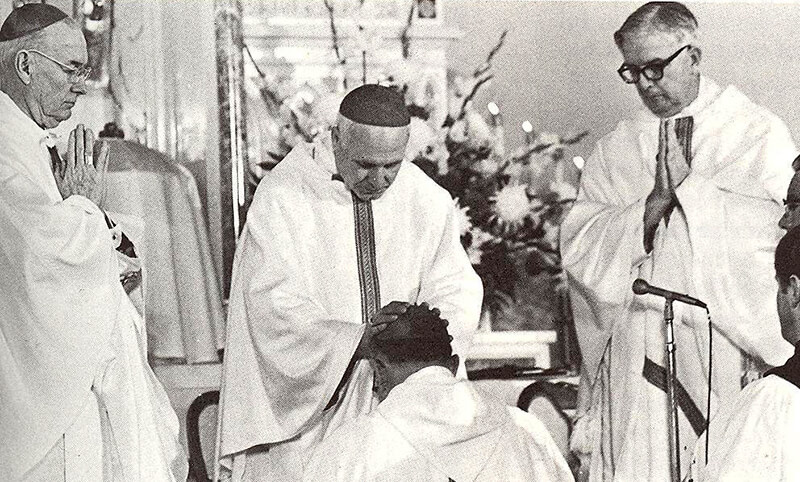
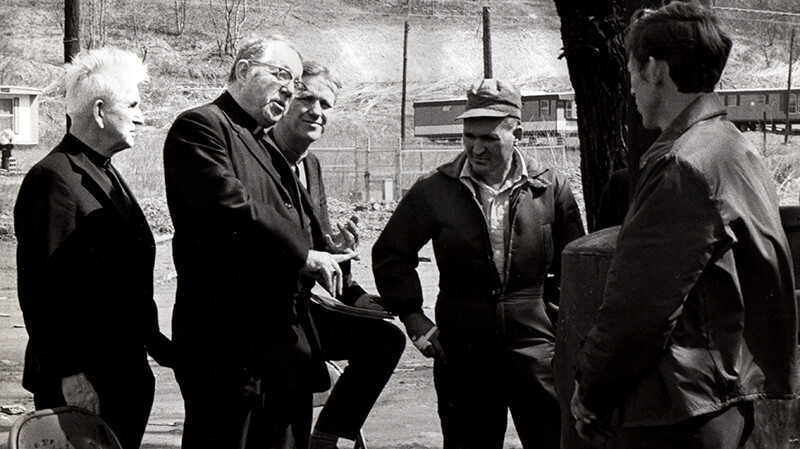
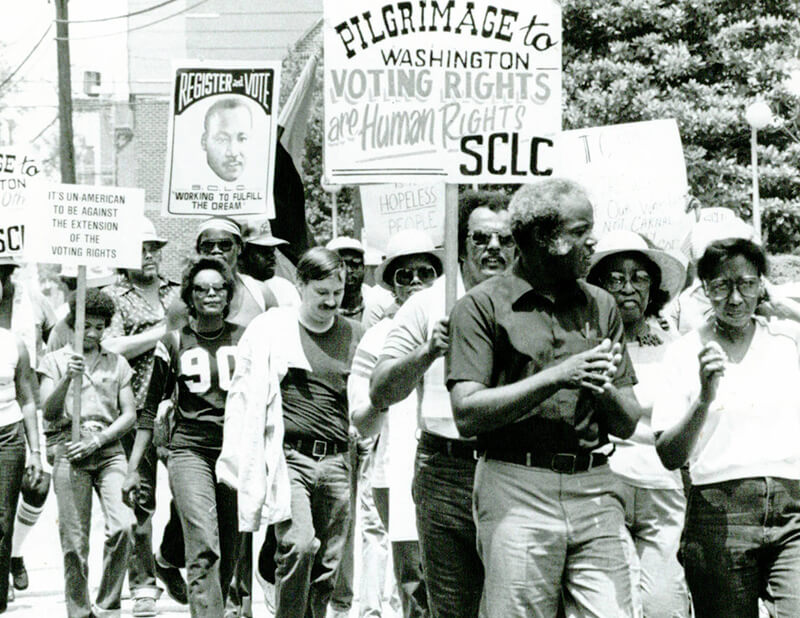
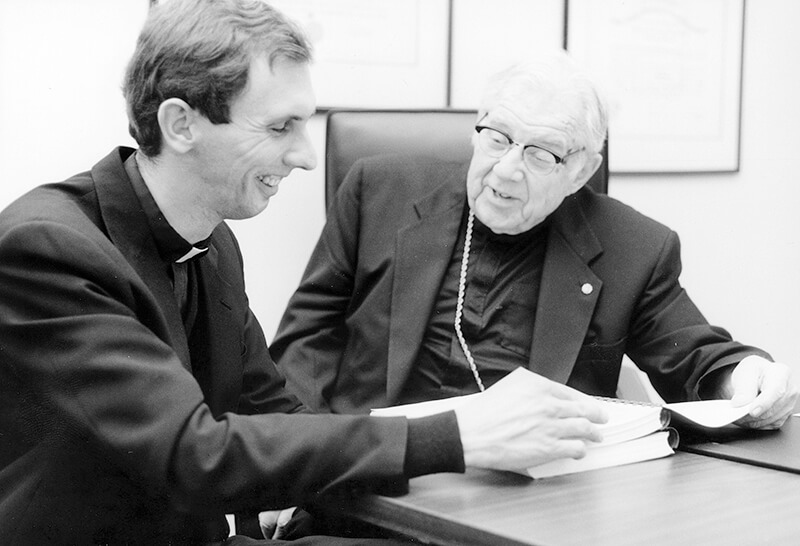
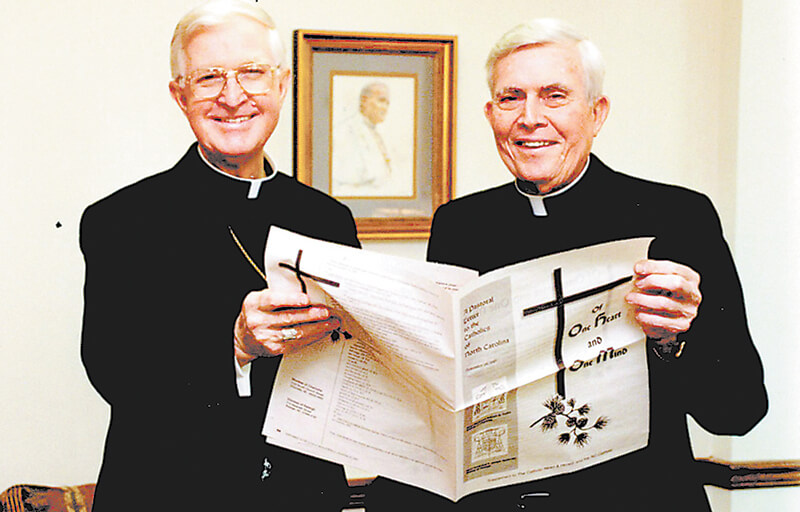
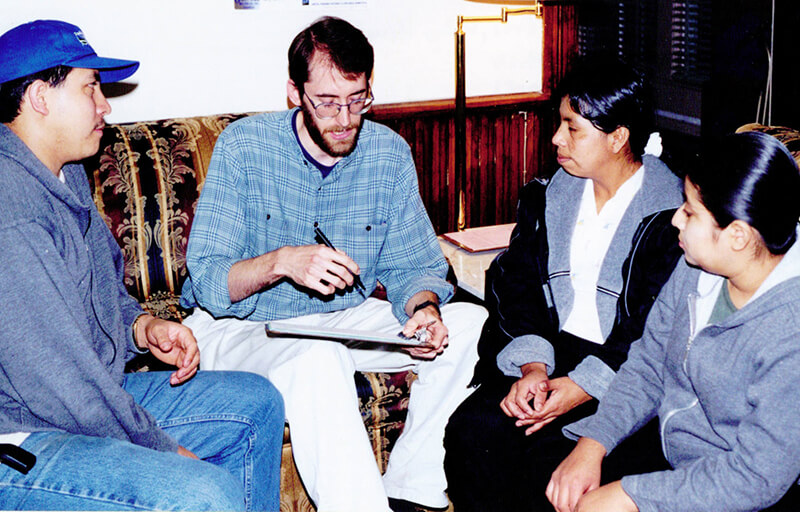
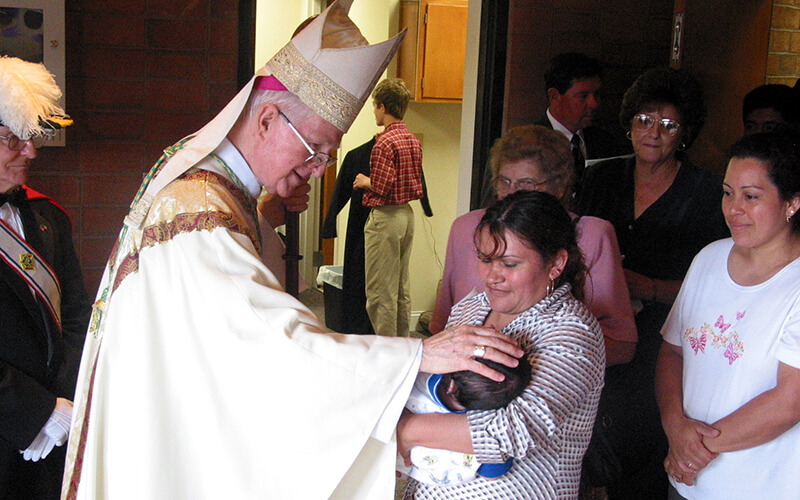
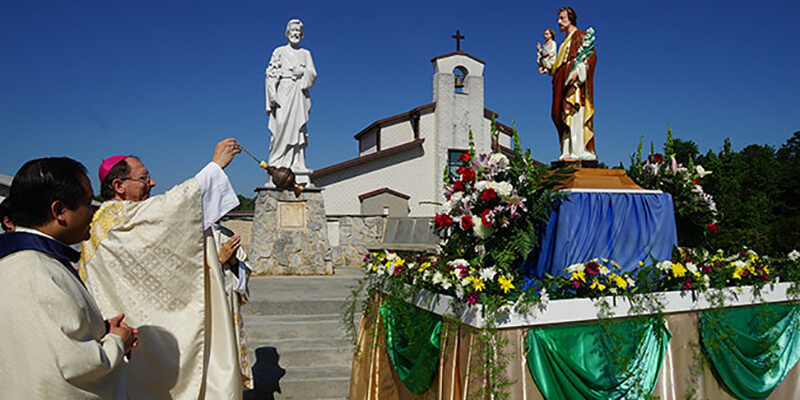
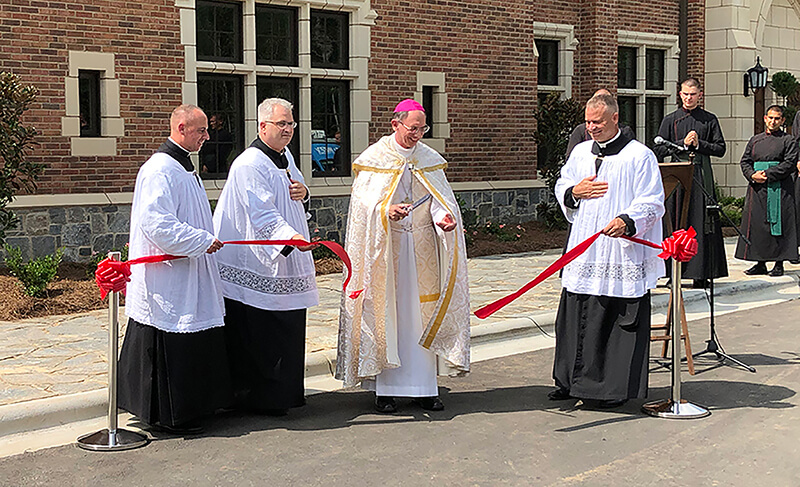
Key Dates in Diocese History
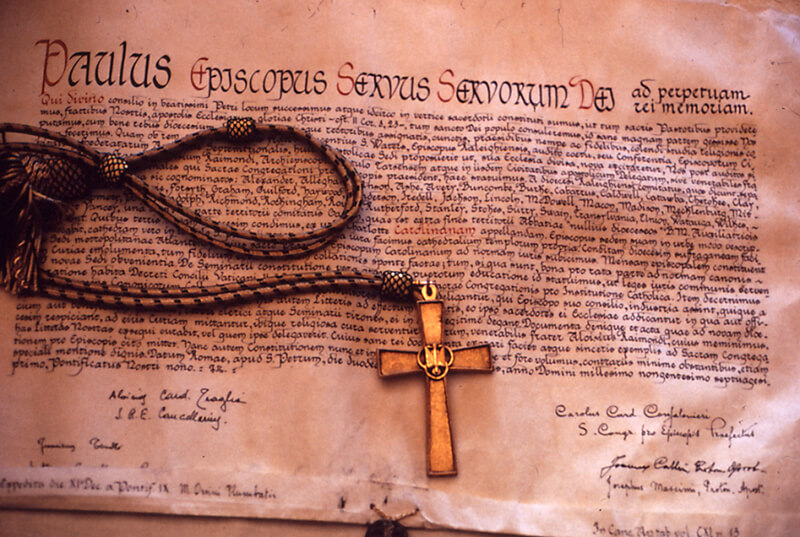
POPE ERECTS NEW DIOCESE
Nov. 12, 1971 — Pope Paul VI issues an apostolic letter, “Qui divino,” declaring he is carving a new diocese out of the then-statewide Diocese of Raleigh. It names the 46 counties of western North Carolina that will comprise the new diocese, and announces: “We establish in this territory a new diocese, to be called Charlotte (Carolinana) from the city of that name. The bishop is to have his seat in the city just mentioned, but is to have his cathedral in the church of Saint Patrick…”
Read More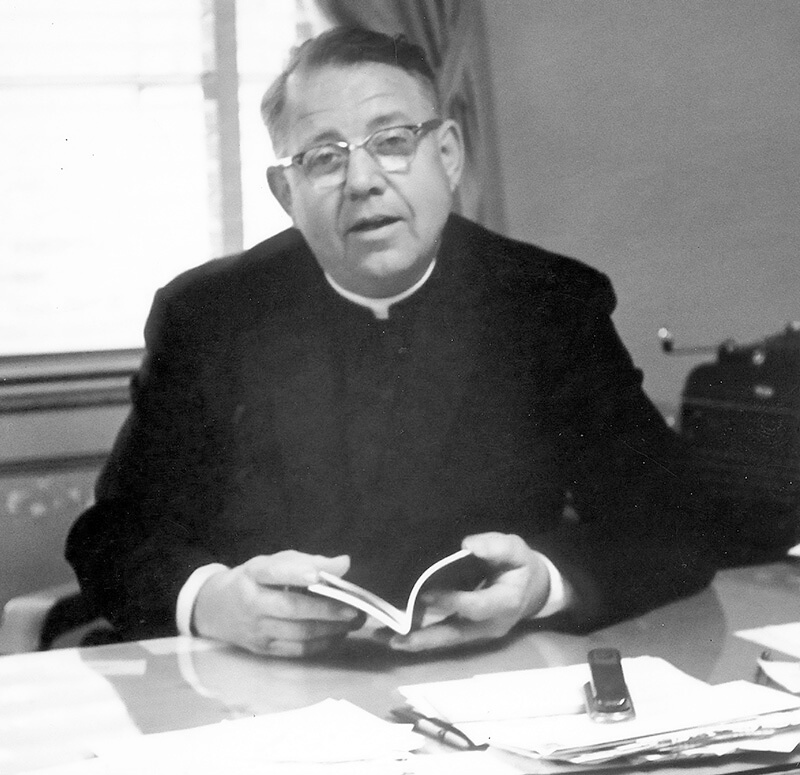
FIRST BISHOP APPOINTED
Nov. 25, 1971 — Father Michael Begley, 62, is officially appointed by Pope Paul VI as the first Bishop of Charlotte. “You, Beloved Son, seemed to us to be the most suited to undertake the government of that diocese because of your outstanding gifts of mind and character,” the pope writes. Bishop-designate Begley replies, “I hope to continue to serve the people of God in the Diocese of Charlotte. … I ask all my friends, Catholic and non-Catholic, to pray that the Holy Spirit will guide our efforts in this new apostolate.”
See Details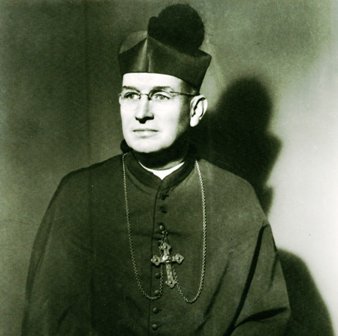
NEWS MADE PUBLIC
Nov. 30, 1971 — Raleigh Bishop Vincent Waters publicly announces the creation of the Diocese of Charlotte and appointment of its first bishop. “When the family of God grows and matures in any place, in the plan of God a new family is set up,” he writes in his pastoral letter announcing the new diocese. “Rejoice with me at this Good News.”
Read More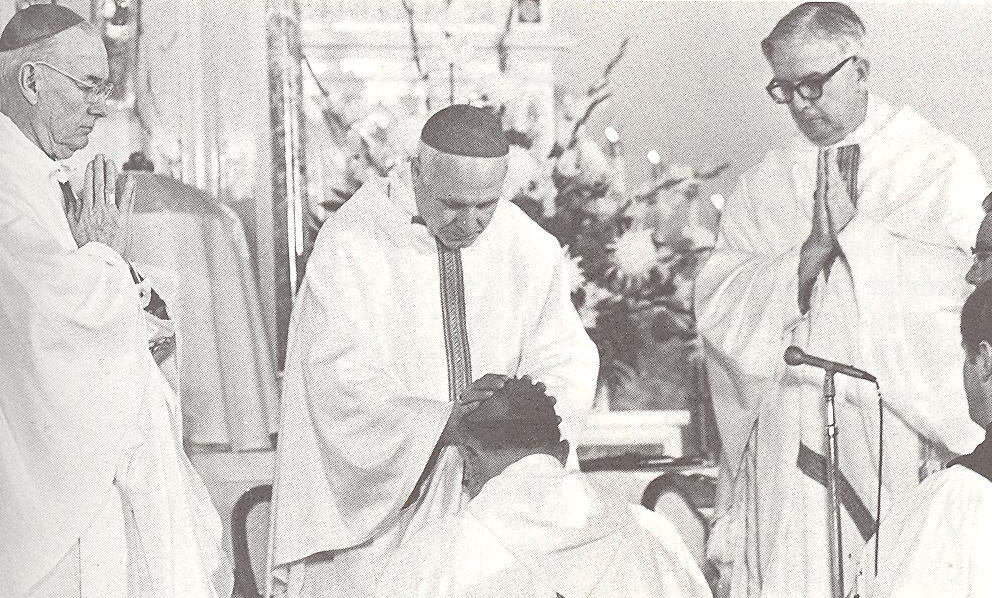
BIRTHDAY OF OUR DIOCESE
Jan. 12, 1972 — Bishop Michael Begley is ordained and installed at St. Patrick Cathedral in Charlotte, N.C., the act officially establishing the Diocese of Charlotte. That night, he and Bishop Waters host a large dinner to celebrate. The next morning, he says, “we were open for business.”
Read MoreHISPANIC MINISTRY FOUNDED
Sept. 9, 1972 — During a Mass in honor of Nuestra Señora de la Caridad del Cobre (“Our Lady of Charity of El Cobre,” patroness of Cuba) Bishop Begley inaugurates a Hispanic Catholic Center (El Centro Católico Hispano) to serve the growing number of Hispanic immigrants. Its purpose: to unite the Hispanic community – mostly long-established Cuban exiles and newly-arrived migrant farm workers – with the diocese. Two years later, Father Joseph Waters is named director.
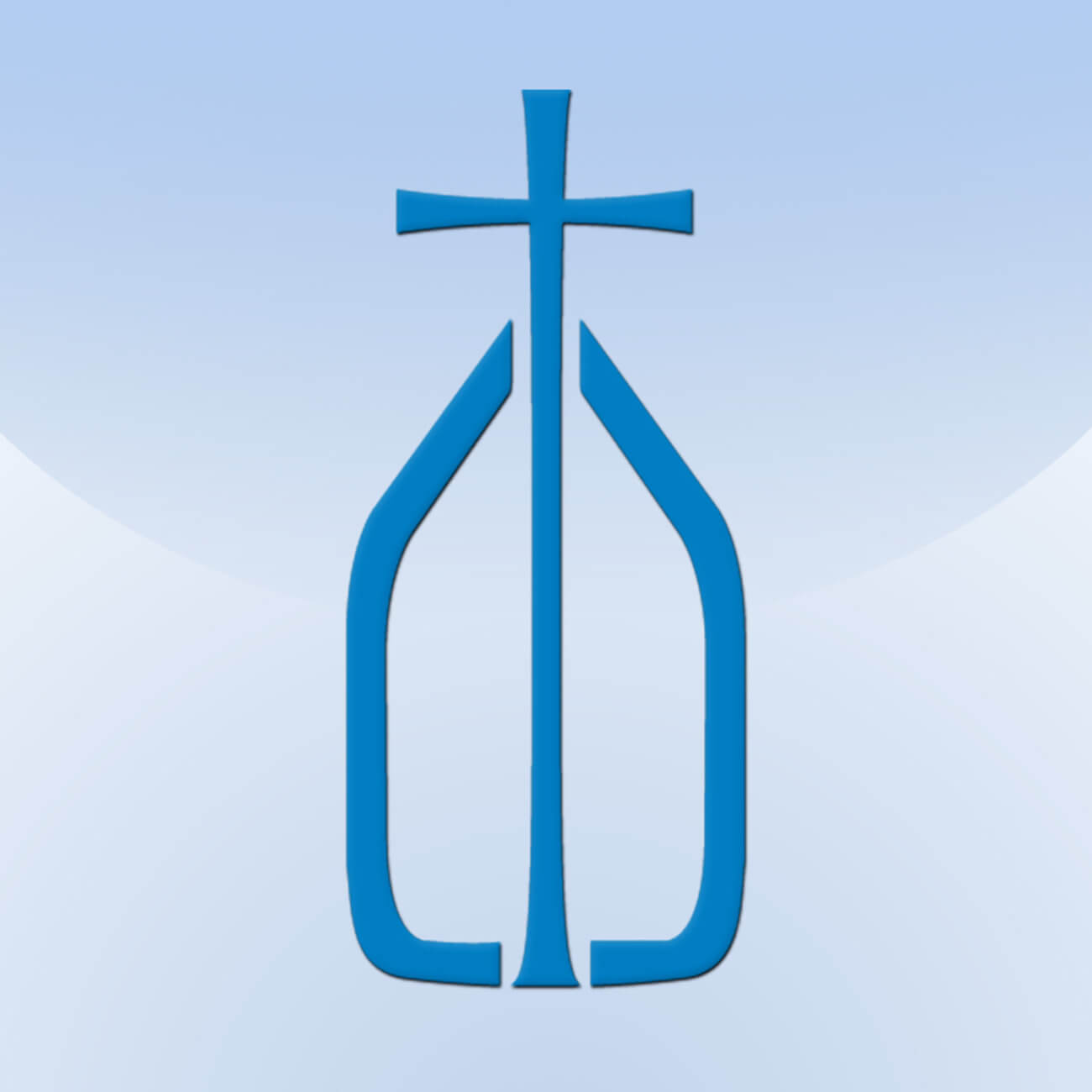
CATHOLIC SOCIAL SERVICES INCORPORATED
May 17, 1973 — The Church’s organized charitable outreach in North Carolina began over a century ago with hospitals offering free or low-cost services to the poor by Benedictine monks and the Sisters of Mercy. In 1948, the Diocese of Raleigh formed The Bureau of Catholic Charities (later renamed Catholic Social Services) to aid the poor and vulnerable statewide. In 1973 Bishop Begley sets up a Catholic Social Services agency for the new Charlotte diocese. Father Thomas Clements is appointed director in collaboration with a team of Trinitarian sisters. The agency is renamed Catholic Charities Diocese of Charlotte in 2013.
READ MOREDIOCESAN BOARD OF EDUCATION ESTABLISHED
A Diocesan Board of Education is established to advise the diocese’s Department of Education (now called the Education Vicariate), which oversees all religious education in the diocese. It is under the direction of the diocese’s first Superintendent of Schools, Father Edward Sheridan.
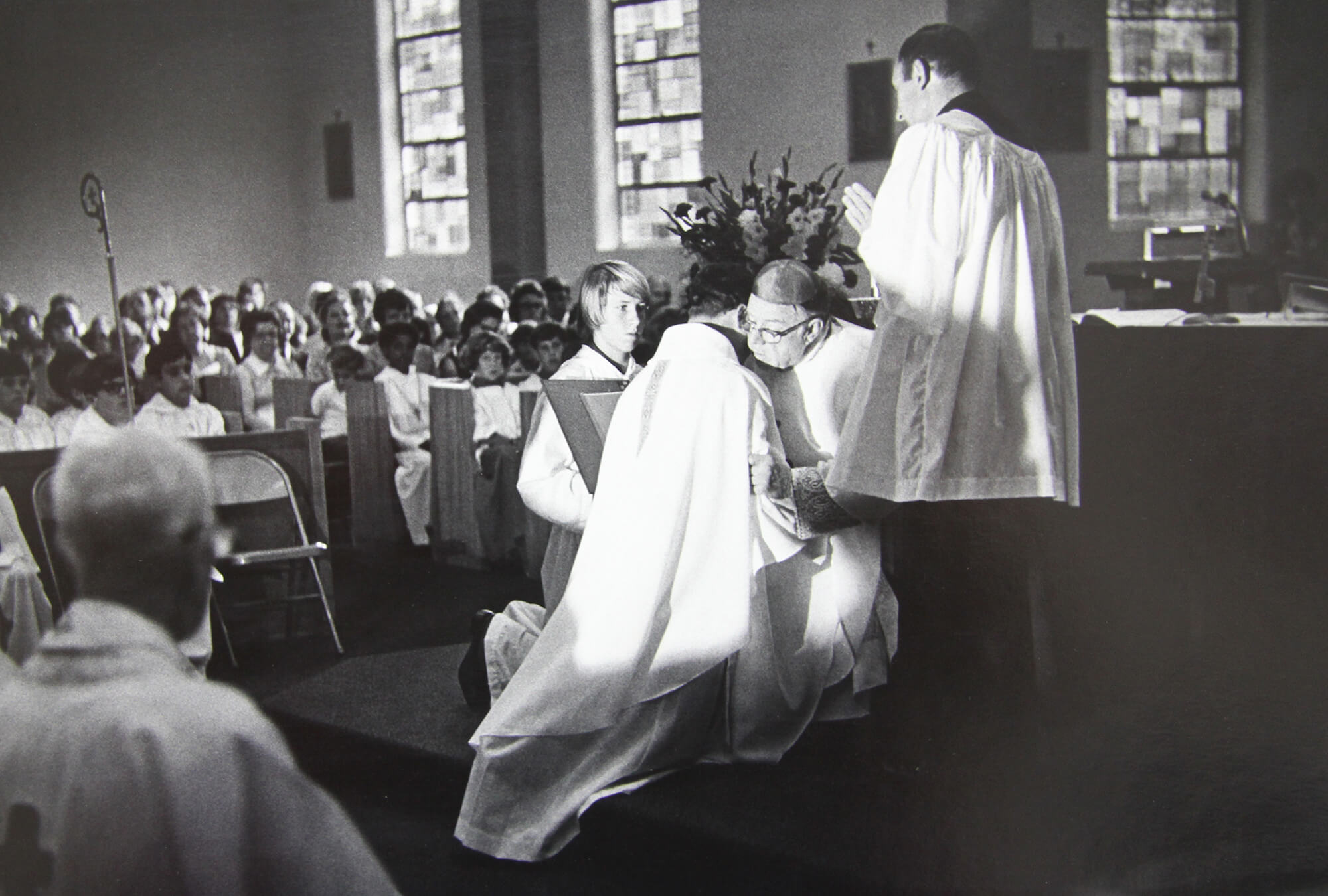
ORDINATION OF FIRST PRIEST FOR THE DIOCESE
Sept. 29, 1974 — John McSweeney is ordained the first priest for the diocese by Bishop Begley. The ordination is held at St. Gabriel Church in Charlotte on the Feast of the Archangels. McSweeney goes on to serve as the diocese’s vicar general and chancellor of the diocese before becoming pastor of what would become our largest parish, St. Matthew in Charlotte. He retires in 2017.
READ MORE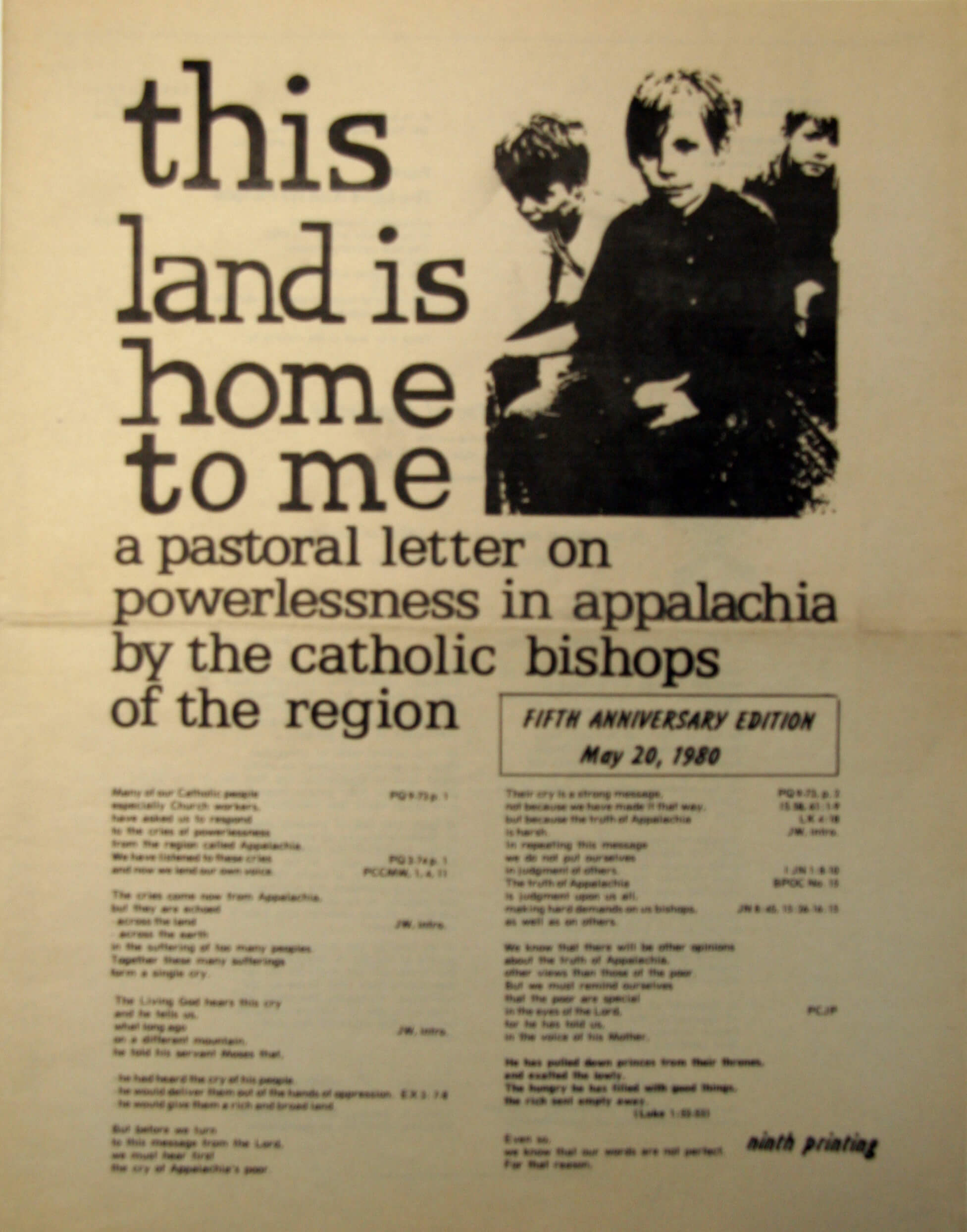
‘THIS LAND IS HOME TO ME’
Feb. 1, 1975 — A landmark pastoral letter that attracts national attention is issued by the 25 Catholic bishops of the Appalachian region. Largely written by Bishop Begley, “This Land is Home to Me” is a call to action to give a voice to the oppressed and powerless people of Appalachia.
READ MOREFIRST DIOCESAN PASTORAL ASSEMBLY
June 6-7, 1975 — Following a two-year planning process, Bishop Begley convenes a Diocesan Pastoral Assembly that, among other things, divides the diocese into vicariates (now totaling 10), strengthens the role of parish councils, establishes a Diocesan Pastoral Council that oversees 6 commissions (family life, education, spiritual life, community life, communications and planning), and announces the diocese’s mission statement: “We, the people of God, in the Diocese of Charlotte, fortified in the Father, redeemed in the Son, and empowered in the Spirit are called to grow ever more perfectly into a community of praise, worship and witness. We seek to become ever more enthusiastically a leaven of service and a sign of peace, through love, in Piedmont and Western North Carolina.”
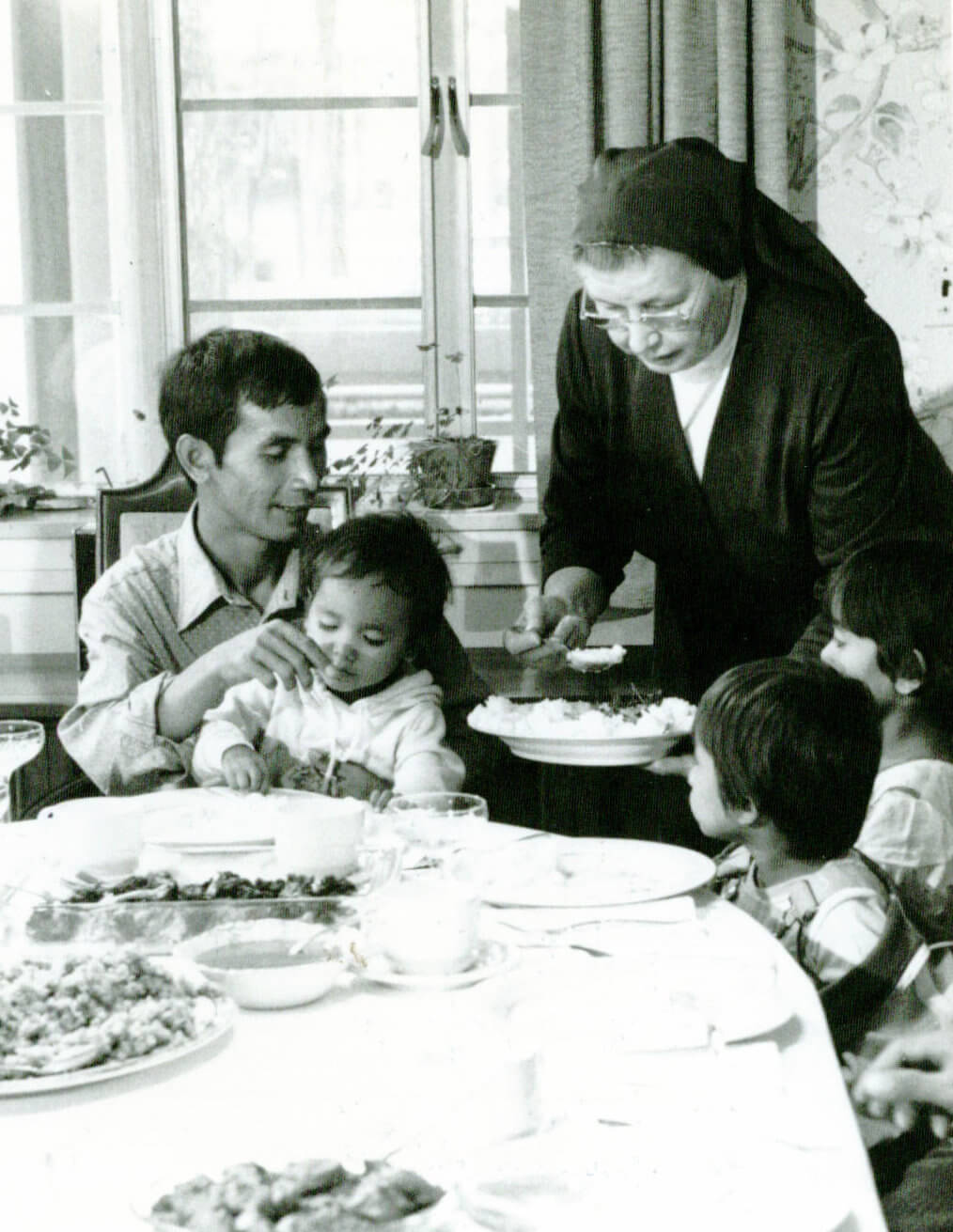
FIRST REFUGEES WELCOMED
The first refugees from Southeast Asia are resettled in the diocese by Catholic Social Services (now Catholic Charities) in coordination with the U.S. Conference of Catholic Bishops: 11 Cambodians, 14 Hmong, and 158 Vietnamese are welcomed and begin new lives in the Charlotte area. Since then, the agency has resettled over 14,000 refugees representing 61 nationalities.
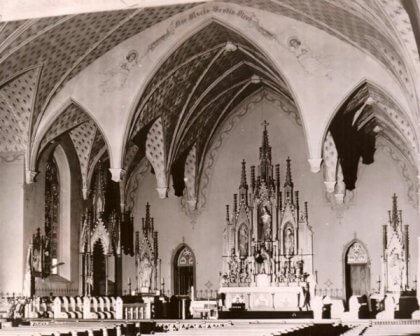
ABBATIA NULLIUS SUPPRESSED
Jan. 1, 1977 — The Abbatia Nullius of Belmont Abbey is suppressed and it comes under the jurisdiction of the diocese. Belmont Abbey had existed as an “Abbatia Nullius Dioecesis” (“abbey of no diocese”) since 1910 – the only abbey in the United States to ever hold that rank.
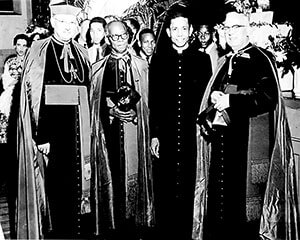
AFRICAN AMERICAN PRIEST BECOMES BISHOP
June 6, 1977 — Father Joseph L. Howze, a priest who served in both the Raleigh and Charlotte dioceses, is installed as Bishop of Biloxi – becoming the first African American bishop to lead a U.S. diocese in the 20th century. In 1982, he returns to Charlotte to deliver the homily during the diocese’s 10th anniversary Mass celebrated at St. Vincent de Paul Church.
READ MOREFIRST DIOCESAN YOUTH CONFERENCE
August 1977 — 173 young people attend the diocese’s first youth conference, held at Our Lady of the Hills Camp near Hendersonville. Two years later, in 1979, the diocese forms a Diocesan Youth Council comprised of representatives from every vicariate.
YOUTH LEADERSHIP PROGRAM LAUNCHED
June 21-26, 1981 — The diocese pilots the international Christian Leadership Institute for high school aged youth, now known as Faithful Servant Catholic Leadership Institute.
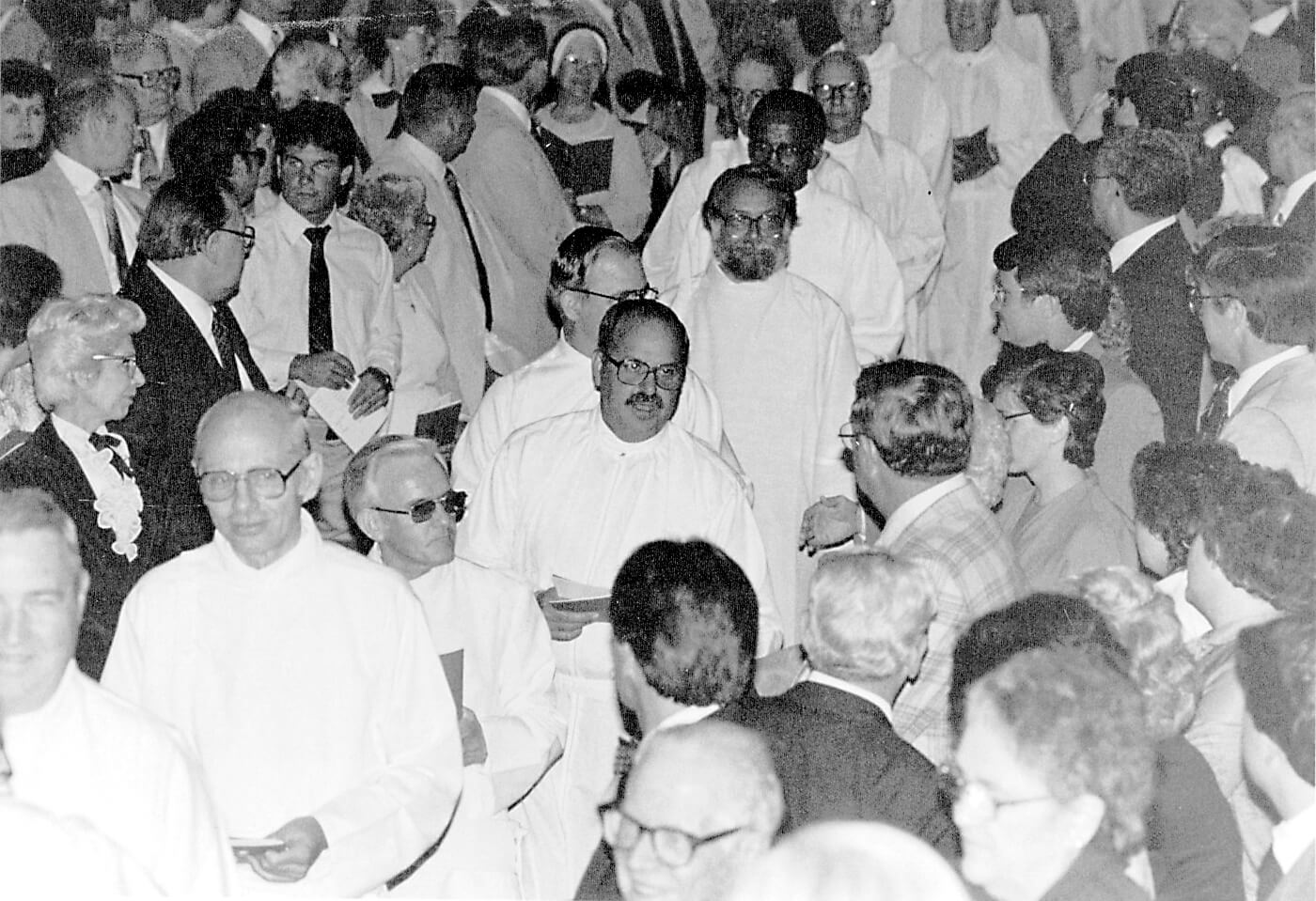
FIRST DEACONS ORDAINED
May 29, 1983 — Before a crowd of 2,000 during a special Mass at Ovens Auditorium in Charlotte, 19 men are ordained permanent deacons for the diocese by Bishop Begley. Two more are ordained shortly afterwards. It is the first such ordination for the diocese since Pope Paul VI approved the U.S. bishops’ request in 1968 to revive the permanent diaconate in this country.
READ MORE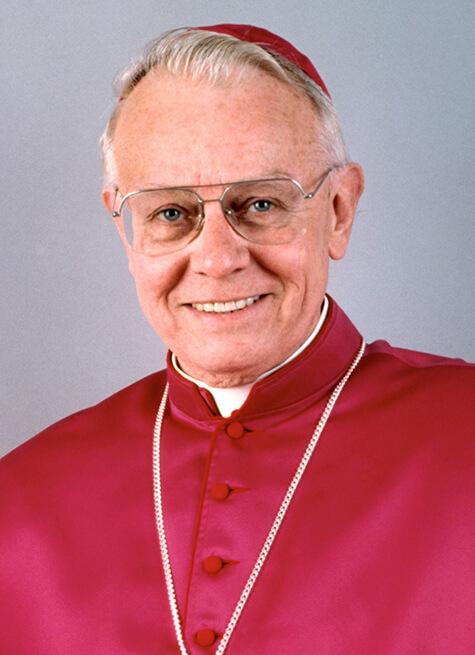
SECOND BISHOP INSTALLED
Dec. 18, 1984 — Bishop John Donoghue is ordained and installed as the second Bishop of Charlotte, after Bishop Begley retires earlier in 1984.
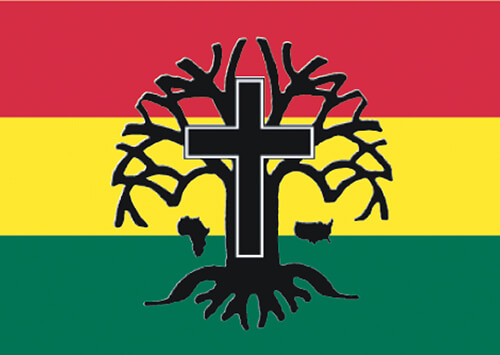
AFRICAN AMERICAN AFFAIRS MINISTRY FORMED
May 17, 1985 — Following extensive work by a 10-member committee of concerned Black Catholics, the diocese’s African American Affairs Ministry is formed to celebrate the diversity and promote the contributions of Black Catholics in western North Carolina.
READ MORE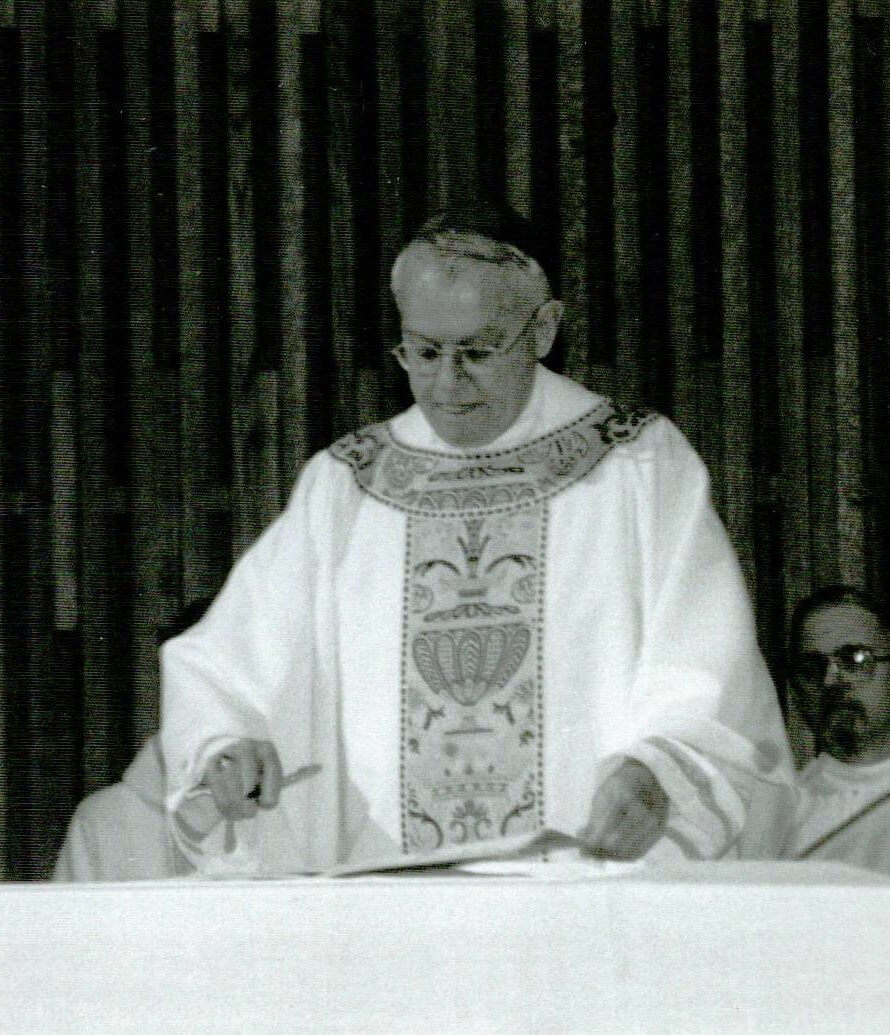
DIOCESAN SYNOD CONCLUDES
May 23, 1987 — Bishop Donoghue promulgates documents coming out of a two-year diocesan synod addressing the issues facing the growing Church in western North Carolina.
READ MORE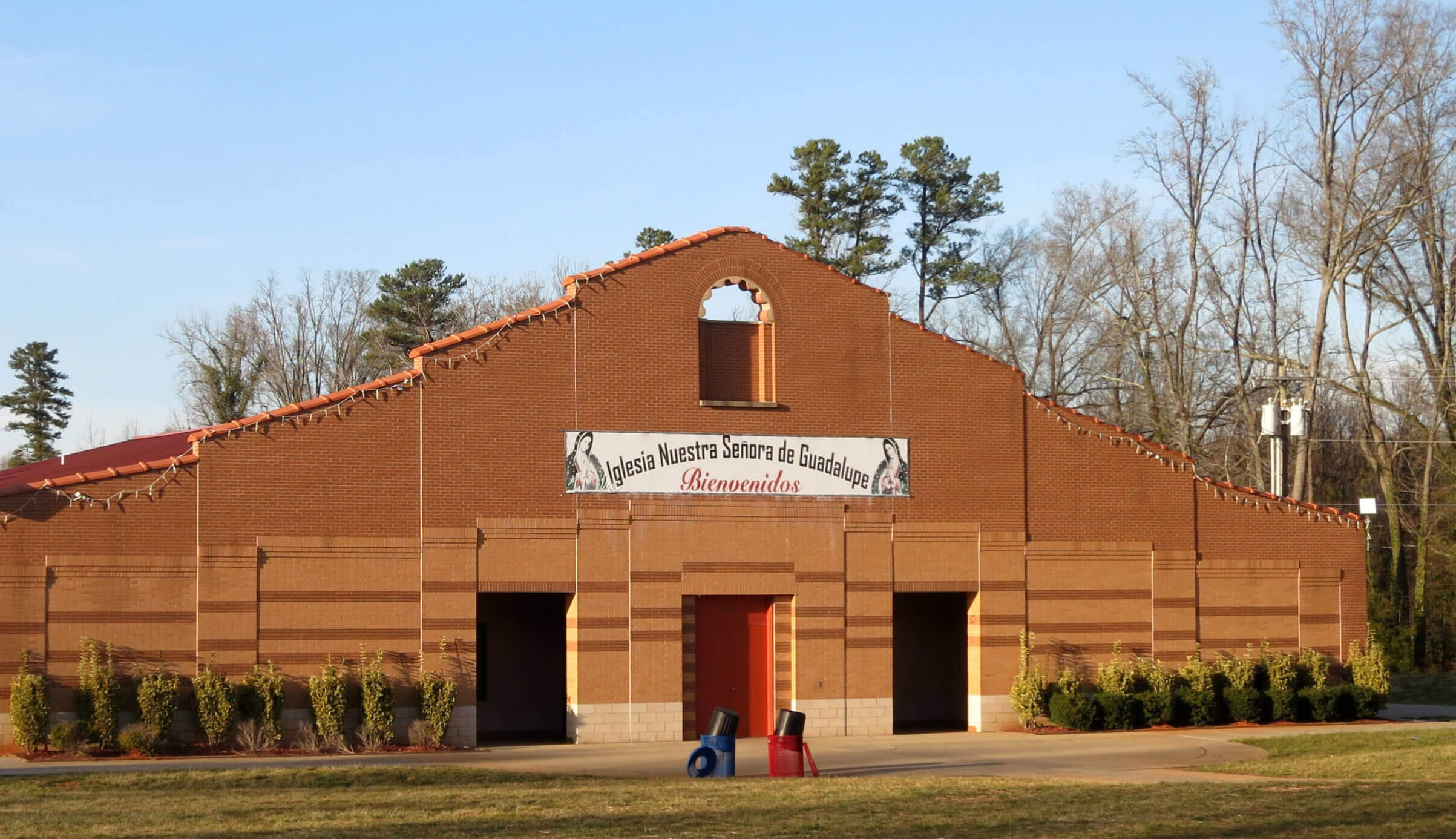
HISPANIC MINISTRY GROWS
Bishop Donoghue elevates the Charlotte-based Hispanic Catholic Center to a diocesan ministry and appoints Sister Pilar Dalmau, ACJ, as director. Its role expands from ministering to mostly migrant workers to broader evangelization through Spanish-language Masses, youth and adult catechesis, and greater lay involvement. The Charlotte-based ministry flourishes, developing into today’s diocesan Office of Hispanic Ministry, encompassing a comprehensive pastoral care network to serve Hispanic Catholics throughout the diocese.
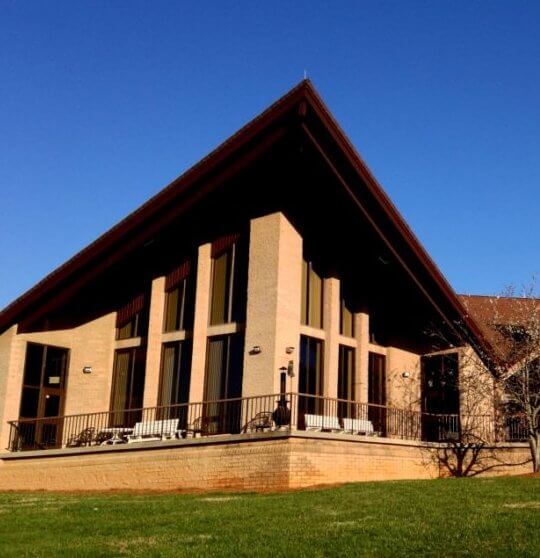
CATHOLIC CONFERENCE CENTER OPENS
Dec. 18, 1988 — The Catholic Conference Center in Hickory, established using proceeds of the sale of Our Lady of the Hills Camp near Hendersonville, is dedicated by Bishop Donoghue. It is to be a place for place for training, renewal and growth for the growing number of Catholics in western North Carolina – and more recently, for thousands of others in search of a unique pastoral setting to come together for contemplation and renewal.
READ MOREMECKLENBURG AREA CATHOLIC SCHOOLS SYSTEM FORMED
Charlotte-area parish schools are consolidated to form Mecklenburg Area Catholic Schools, to strengthen the quality of education and make it available to more children. The plan, announced by Bishop Donoghue in July, will take effect for the 1992-93 school year. The MACS system has since grown from 2,420 to more than 4,000 students in grades PK-12.
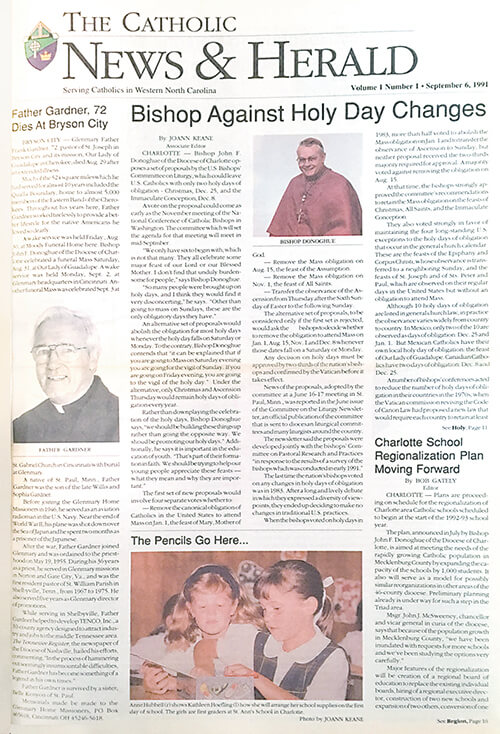
CATHOLIC NEWS & HERALD FOUNDED
Sept. 6, 1991 — Bishop Donoghue founds the Catholic News & Herald, separate from the Raleigh diocese’s publication, The North Carolina Catholic. Its mission: to be “a voice for evangelization” and “vigorous in expounding the truth.” In 2010, the name is shortened to Catholic News Herald.
READ THE ISSUE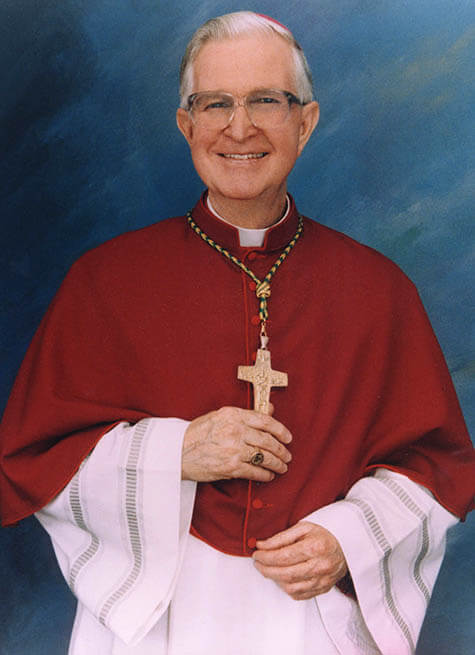
THIRD BISHOP INSTALLED
April 13, 1994 — Bishop William Curlin is installed as the third Bishop of Charlotte, after Bishop Donoghue is elevated to be Archbishop of Atlanta in June 1993. “I hope you will see Jesus all around you,” he tells people in his homily at the installation Mass, celebrated at St. Gabriel Church in Charlotte. “The mission of the Church is the mission of Jesus.”
READ MORE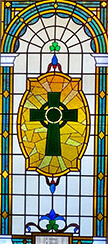
PERPETUAL ADORATION IN HIGH POINT
June 5, 1994 — Maryfield at Pennybyrn, a senior living community in High Point founded by the Poor Servants of the Mother of God, establishes Perpetual Eucharistic Adoration on the Feast of Corpus Christi – the longest-running such prayer effort within the diocese.
READ MOREFOUNDATION ESTABLISHED
The Foundation of the Roman Catholic Diocese of Charlotte is established to provide endowments to bolster the long-term financial stability for the Church in western North Carolina. The foundation has grown to over $74 million in assets and 300+ endowments that support the future of our diocese, its parishes, schools and agencies. Over 1,400 individuals have either remembered the Church or will remember the Church in their estate plans.
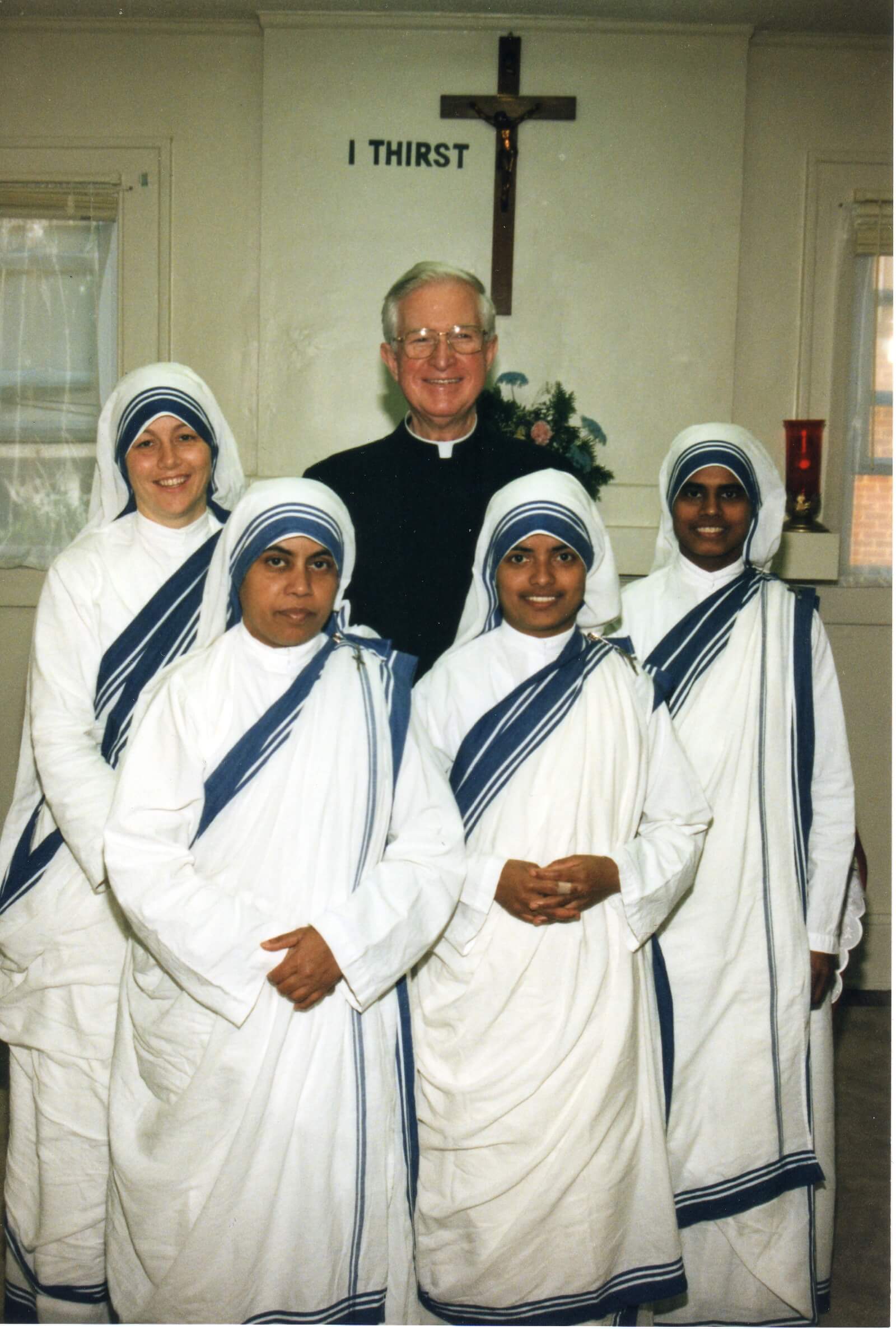
MOTHER TERESA VISITS CHARLOTTE
June 13, 1995 — Mother Teresa of Calcutta visits Charlotte and establishes a Missionaries of Charity convent. Before a crowd of thousands at the Charlotte Coliseum, the 85-year-old Nobel laureate and future saint says, “I have no gold and silver to give you. What I have, I give with my whole heart. I give you my sisters.”
WATCH VIDEO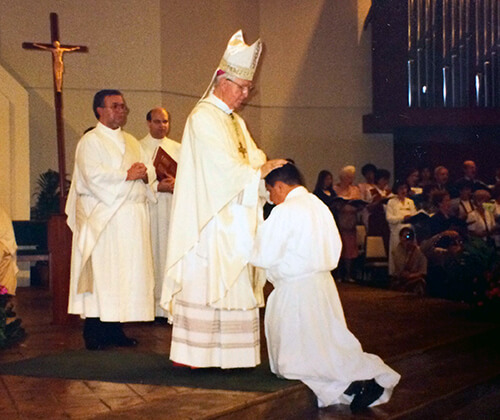
FIRST HISPANIC DEACONS ORDAINED
July 1, 1995 — Bishop Curlin ordains the diocese’s first Hispanic deacons during Mass at St. Gabriel Catholic Church in Charlotte. Carlos Medina, Rafael Torres and Edwin Rodríguez are among 11 men ordained deacons that day, becoming the nucleus of what today is a growing Latino diaconate presence.
READ MORE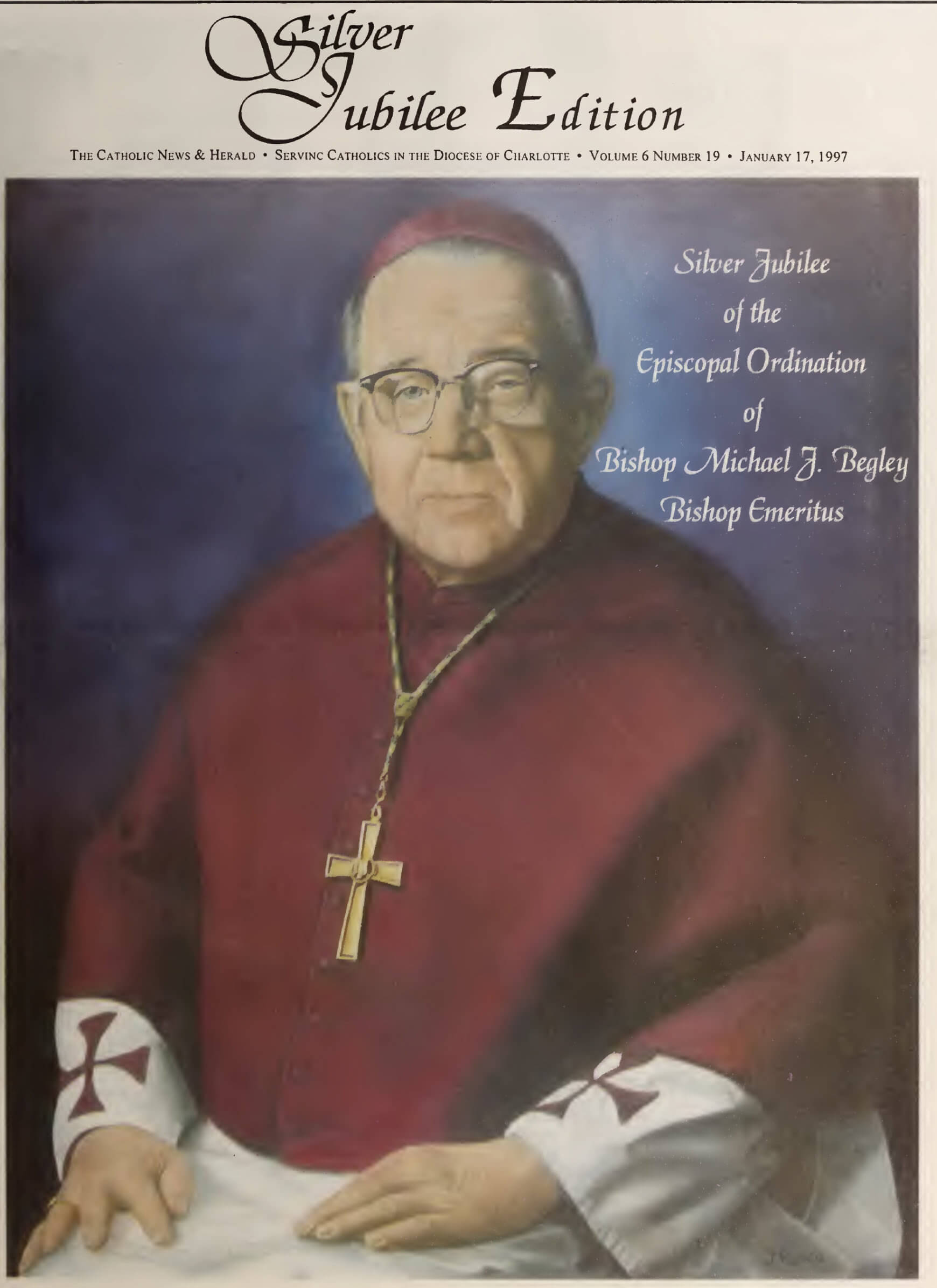
25TH ANNIVERSARY
Jan. 12, 1997 — The diocese commemorates its 25th anniversary and the silver jubilee of the ordination of its first bishop, Bishop Begley. The Catholic population in western North Carolina is estimated to be 104,000 at the time.
READ MORE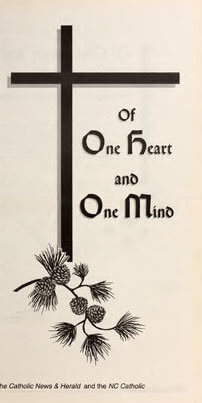
‘OF ONE HEART AND ONE MIND’
Nov. 21, 1997 — Bishop Curlin and Raleigh Bishop Joseph Gossman pen “Of One Heart and One Mind,” a pastoral letter urging their flocks and all North Carolinians to address chronic economic disparity and inequality: “… As followers of Jesus Christ our Lord, and as pastoral leaders of the Roman Catholic community in North Carolina, we feel compelled to express our grave concern for the children, women and men in our state who lack sufficient economic means to live full and fruitful lives.”
READ THE LETTER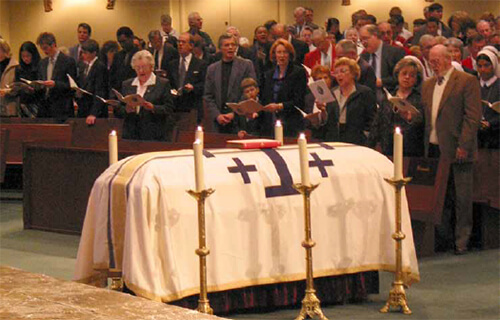
BISHOP BEGLEY DIES
Feb. 9, 2002 — Bishop Begley, founding bishop of the diocese, dies aged 92. “The Diocese of Charlotte was truly blessed with this good and holy man of God,” his successor Bishop Curlin notes. “All who knew him can testify to his deep love for Christ and his zealous dedication to his priestly ministry.”
READ MORE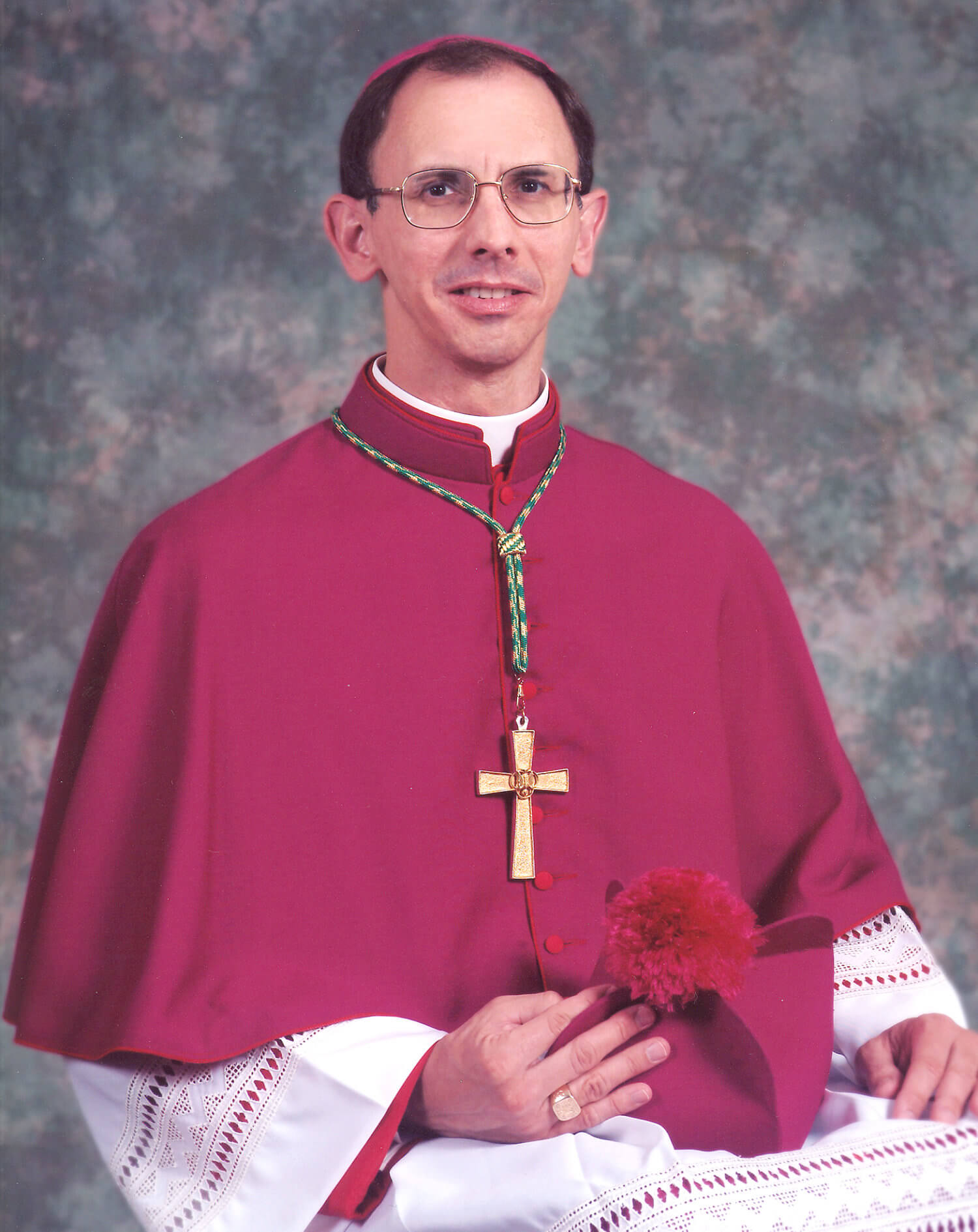
FOURTH BISHOP INSTALLED
Oct. 24, 2003 — Bishop Peter Jugis, a native North Carolinian and priest of the diocese, is consecrated the fourth Bishop of Charlotte, succeeding Bishop Curlin who retired in September 2002. The installation Mass at St. Matthew Church in Charlotte includes Bishop Emeritus Curlin and Atlanta Archbishop John Donoghue, the diocese’s second bishop. Archbishop Donoghue calls the new bishop “a man for the times and for the place.”
READ MORE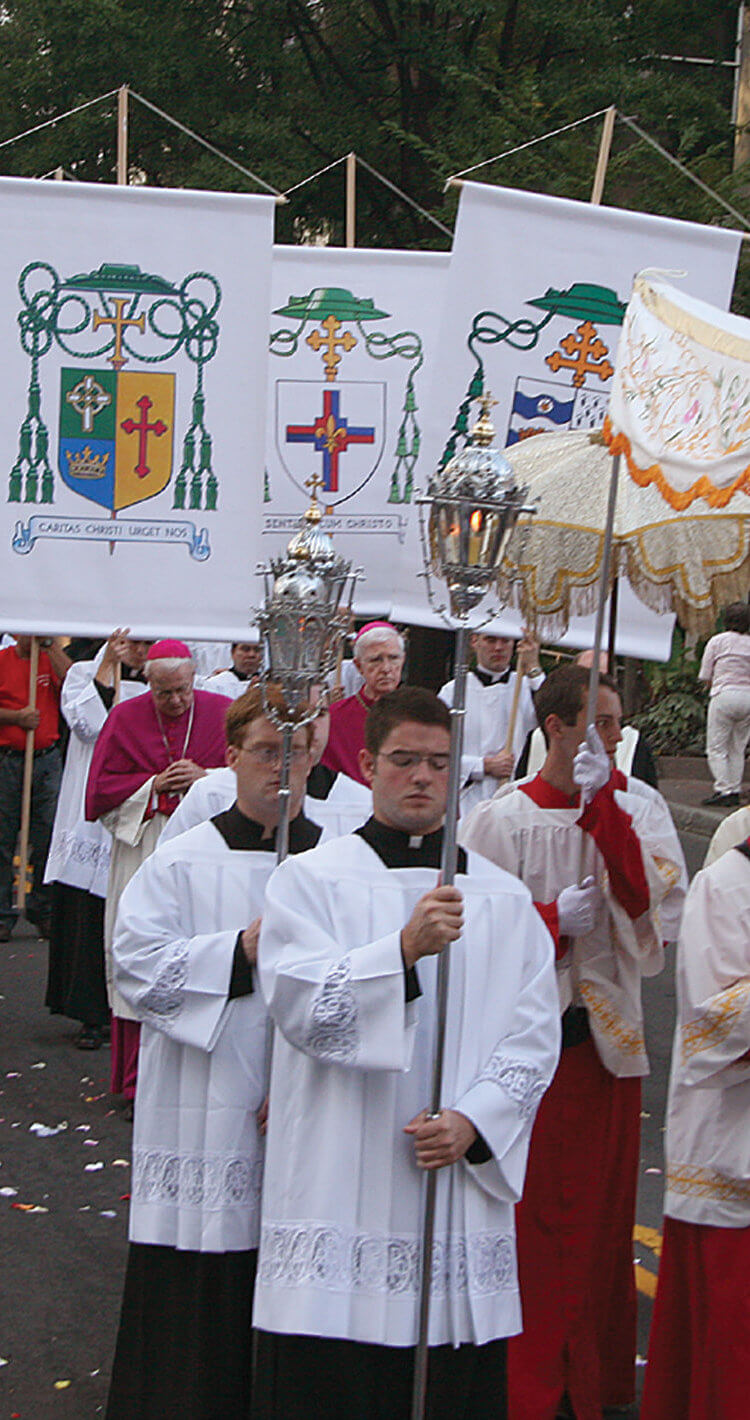
FIRST EUCHARISTIC CONGRESS HELD
Sept. 23-24, 2005 — The inaugural Diocese of Charlotte Eucharistic Congress – themed “Come Let Us Adore Him” – is held at the Charlotte Convention Center. The first such diocese-wide event draws approximately 3,500 people. In a procession through the streets of uptown Charlotte, Bishop Jugis carries a monstrance blessed by St. John Paul II, who ordained him a priest and appointed him bishop. He tells participants, “What better avenue to bring us together than the Eucharist, the sacrament of unity, which makes us the living Body of Christ.”
READ MORE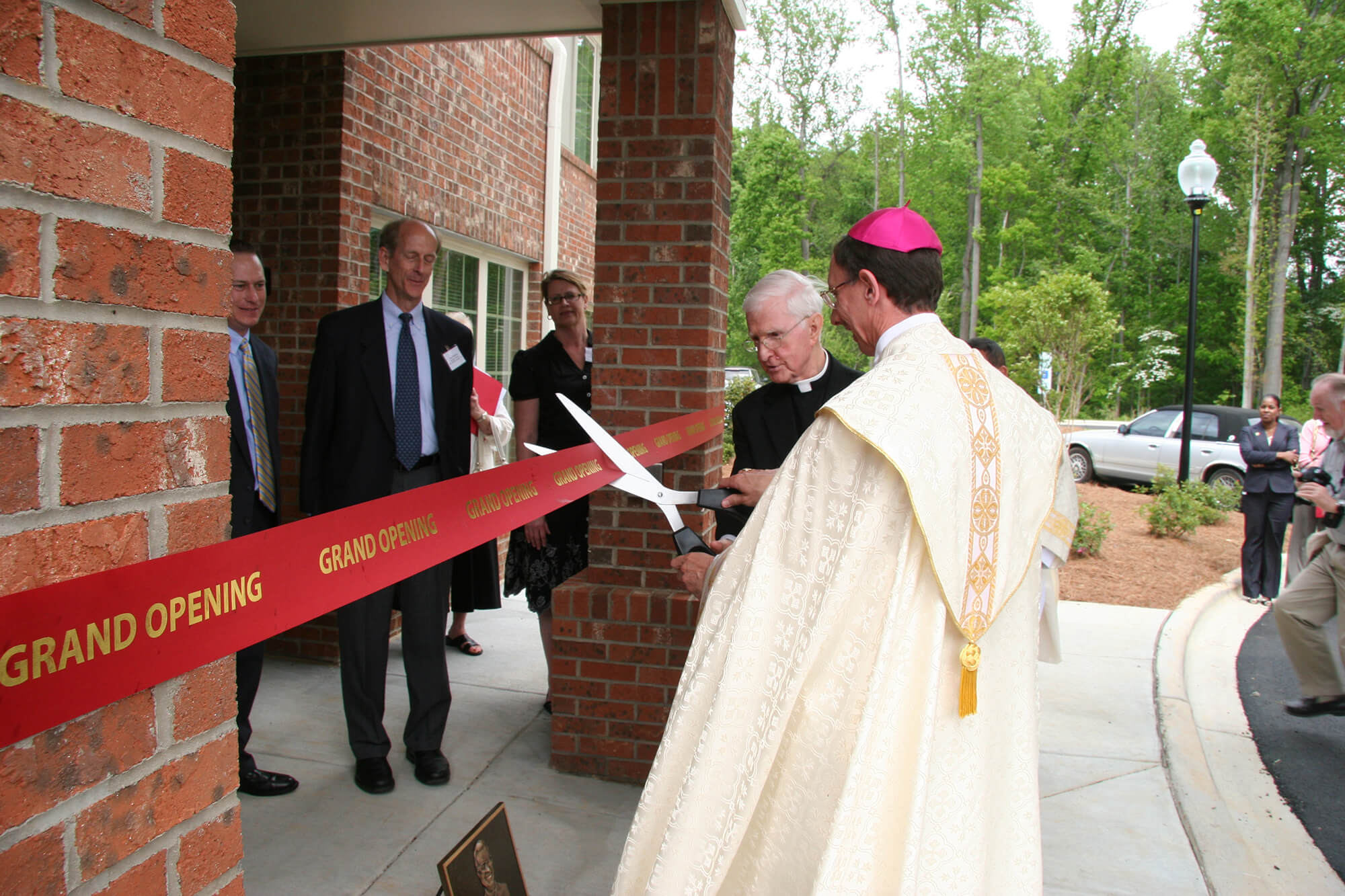
FIRST HOUSING PROJECT
April 20, 2010 — The Diocese of Charlotte Housing Corp. opens Curlin Commons in Mooresville, its first affordable housing project for seniors. It is named for Bishop Emeritus Curlin, who established the diocese’s housing ministry in 2001 to provide affordable housing for people in need. Three more open in subsequent years: two in Charlotte and one in Salisbury.
READ MORE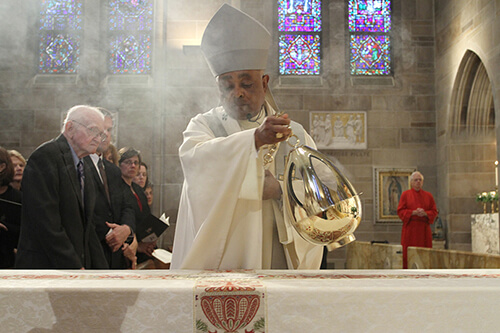
ARCHBISHOP DONOGHUE DIES
Nov. 11, 2011 — Archbishop Donoghue dies in Atlanta, aged 83. Bishop Jugis notes, “Archbishop John Donoghue was a great leader during his nine years of service in the Diocese of Charlotte. He saw that rapid growth was going to take place … and he prepared for it. His devotion to the Eucharist and perpetual adoration, as well as his guidance in the establishment of the Eucharistic Congress, are testaments to his service to God that will live on in both Charlotte and Atlanta.”
READ MORE
‘FORWARD IN FAITH, HOPE AND LOVE’
An unprecedented diocese-wide campaign is launched, raising $54 million to provide transformative funding for parish life and ministries, clergy support, Catholic education, Catholic outreach, and pastoral and temporal needs. It also aims to solidify the diocese’s future through endowments and major capital projects.
READ MORE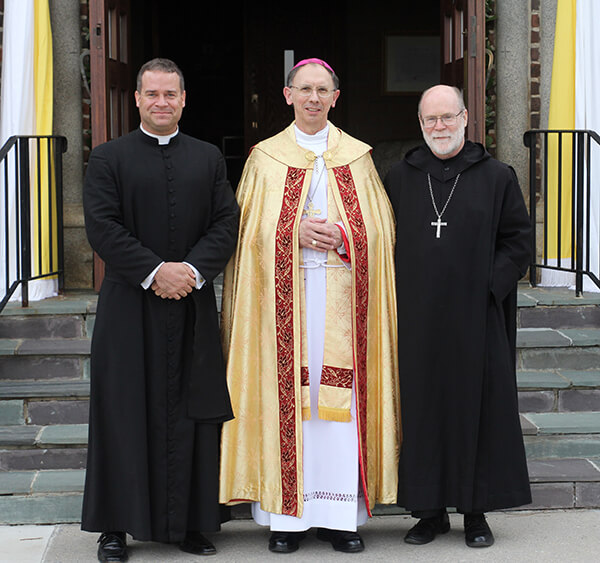
ST. JOSEPH COLLEGE SEMINARY ERECTED
March 19, 2016 — Bishop Jugis founds St. Joseph College Seminary, appointing Father Matthew Kauth as rector. The special ceremony, held at Belmont Abbey on the Feast of St. Joseph – a nod to the diocese’s historical roots – includes Benedictine Abbot Placid Solari. The first class of eight men enters the formation program in August.
READ MORE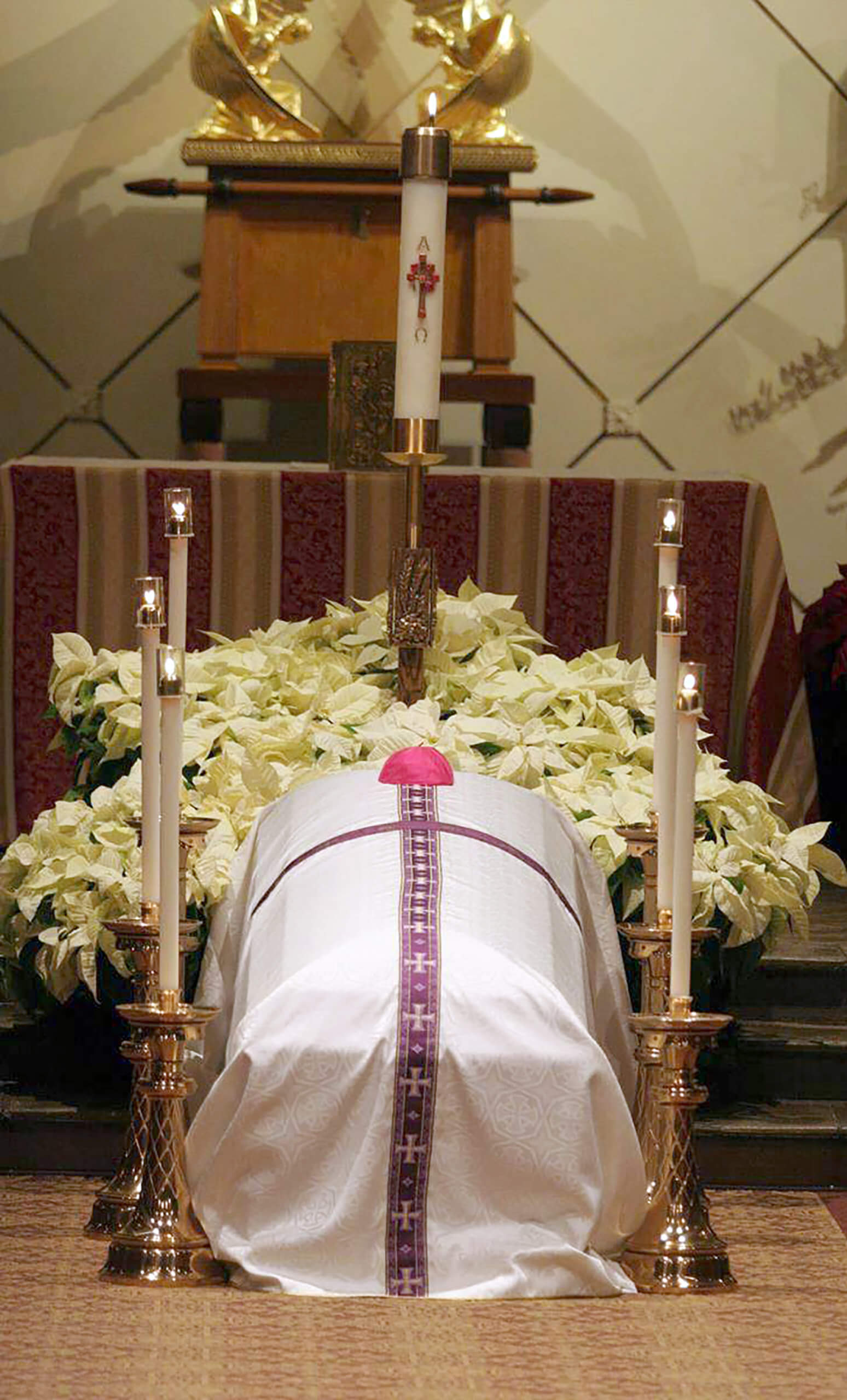
BISHOP EMERITUS CURLIN DIES
Dec. 23, 2017 — Bishop Emeritus Curlin dies, aged 90. “When Bishop Curlin smiled at you, it was Jesus smiling. And when he embraced you, it was the embrace of Jesus,” his close friend Archbishop William Lori of Baltimore recalls during the funeral service.
READ MORE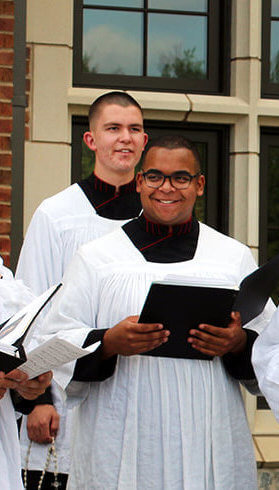
HOME FOR ST. JOSEPH COLLEGE SEMINARY
Sept. 15, 2020 — A permanent home for St. Joseph College Seminary is opened and blessed by Bishop Jugis on the feast of Our Lady of Sorrows – two years to the day since ground was broken amid the wind and rain of Hurricane Florence, and despite challenges posed by the COVID-19 pandemic. The Gothic-style building is only a couple miles from Belmont Abbey, where in 1876 Benedictine monks planted the roots of Catholicism here.
READ MOREFAMILY LIFE OFFICE ESTABLISHED
Dec. 26, 2021 — Bishop Jugis announces the formation of an Office of Family Life “to strengthen and magnify our ministry and outreach to families.” Services previously under the umbrella of Catholic Charities are moved to the new ministry, including Marriage Preparation, Respect Life and Natural Family Planning.
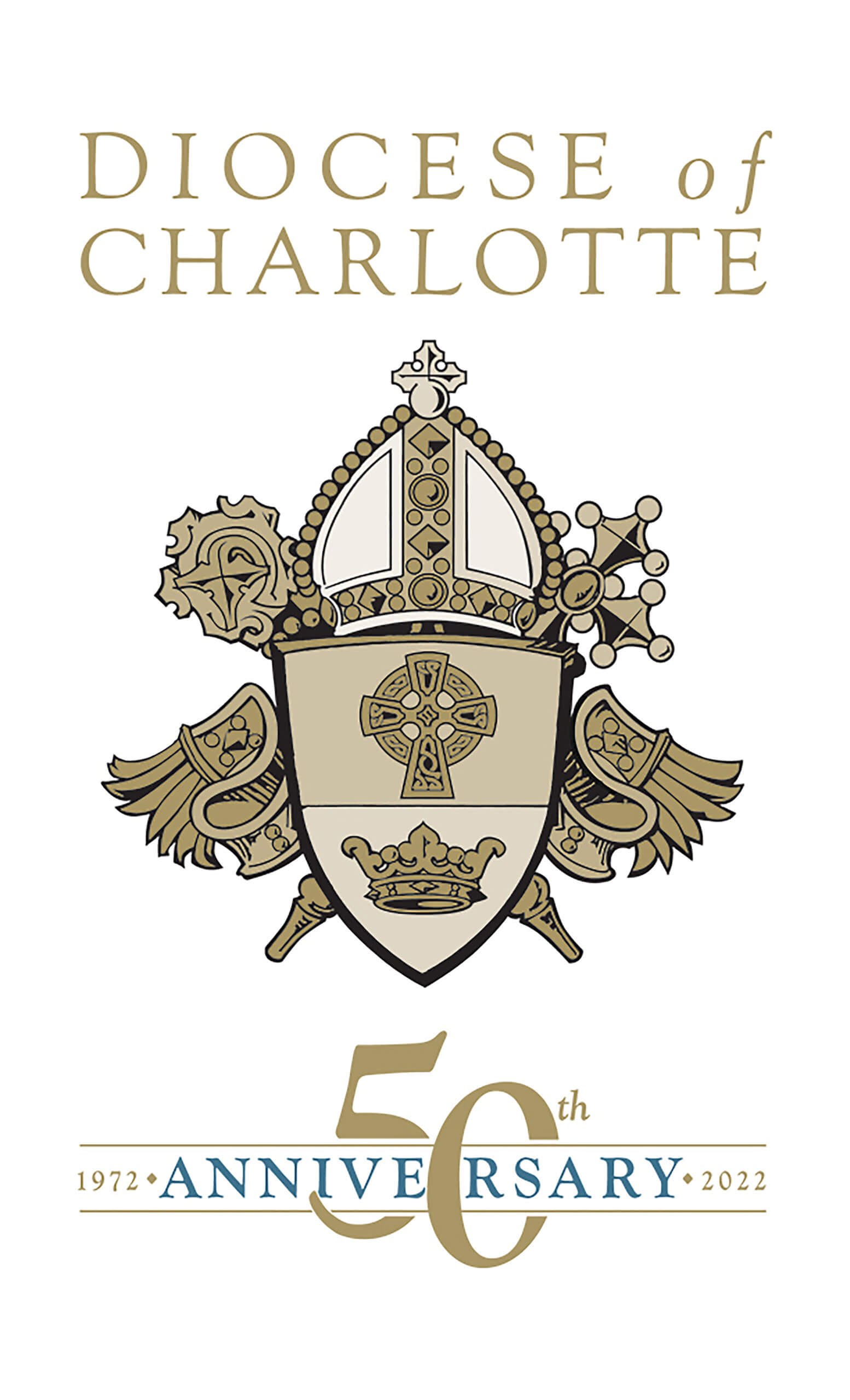
50TH ANNIVERSARY
Jan. 12, 2022 — The diocese launches its golden anniversary year, themed “Faith More Precious Than Gold” (1 Peter 1:7). The Catholic population in western North Carolina is now estimated to be 515,000.
